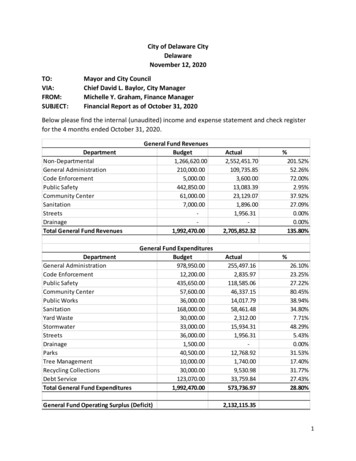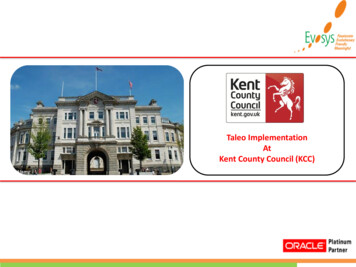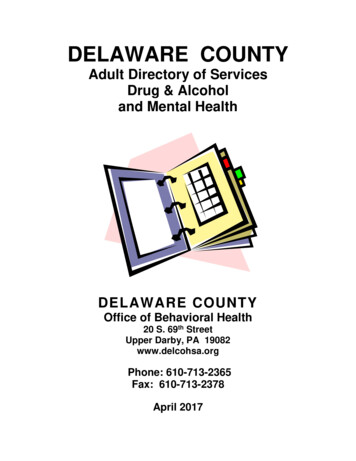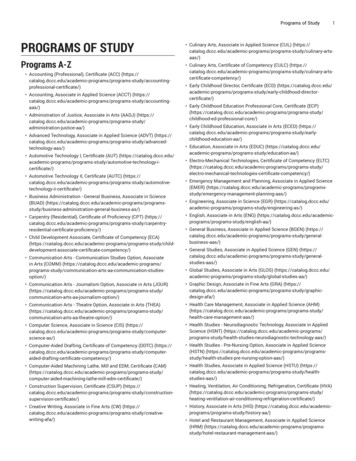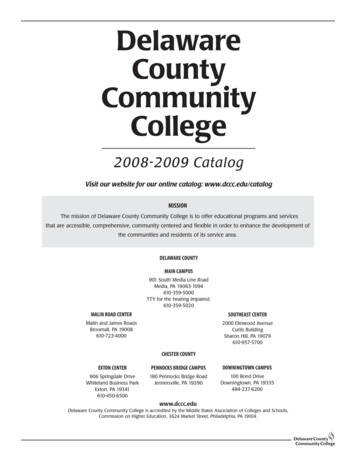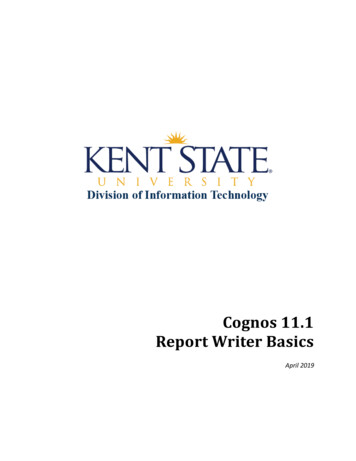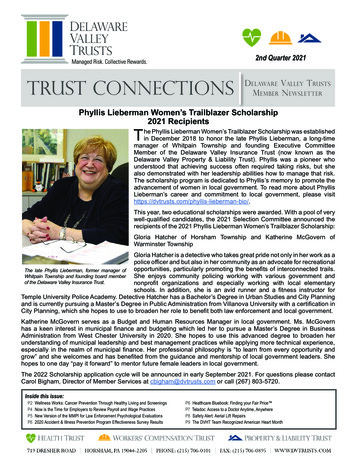
Transcription
2nd Quarter 2021Trust ConnectionsDelaware Valley TrustsMember NewsletterPhyllis Lieberman Women’s Trailblazer Scholarship2021 RecipientsThe Phyllis Lieberman Women’s Trailblazer Scholarship was establishedin December 2018 to honor the late Phyllis Lieberman, a long-timemanager of Whitpain Township and founding Executive CommitteeMember of the Delaware Valley Insurance Trust (now known as theDelaware Valley Property & Liability Trust). Phyllis was a pioneer whounderstood that achieving success often required taking risks, but shealso demonstrated with her leadership abilities how to manage that risk.The scholarship program is dedicated to Phyllis’s memory to promote theadvancement of women in local government. To read more about PhyllisLieberman’s career and commitment to local government, please his year, two educational scholarships were awarded. With a pool of verywell-qualified candidates, the 2021 Selection Committee announced therecipients of the 2021 Phyllis Lieberman Women’s Trailblazer Scholarship:Gloria Hatcher of Horsham Township and Katherine McGovern ofWarminster TownshipGloria Hatcher is a detective who takes great pride not only in her work as apolice officer and but also in her community as an advocate for recreationalopportunities, particularly promoting the benefits of interconnected trails.The late Phyllis Lieberman, former manager ofShe enjoys community policing working with various government andWhitpain Township and founding board memberof the Delaware Valley Insurance Trust.nonprofit organizations and especially working with local elementaryschools. In addition, she is an avid runner and a fitness instructor forTemple University Police Academy. Detective Hatcher has a Bachelor’s Degree in Urban Studies and City Planningand is currently pursuing a Master’s Degree in Public Administration from Villanova University with a certification inCity Planning, which she hopes to use to broaden her role to benefit both law enforcement and local government.Katherine McGovern serves as a Budget and Human Resources Manager in local government. Ms. McGovernhas a keen interest in municipal finance and budgeting which led her to pursue a Master’s Degree in BusinessAdministration from West Chester University in 2020. She hopes to use this advanced degree to broaden herunderstanding of municipal leadership and best management practices while applying more technical experience,especially in the realm of municipal finance. Her professional philosophy is “to learn from every opportunity andgrow” and she welcomes and has benefited from the guidance and mentorship of local government leaders. Shehopes to one day “pay it forward” to mentor future female leaders in local government.The 2022 Scholarship application cycle will be announced in early September 2021. For questions please contactCarol Bigham, Director of Member Services at cbigham@dvtrusts.com or call (267) 803-5720.Inside this issue:P2P4P5P6Wellness Works: Cancer Prevention Through Healthy Living and ScreeningsNow is the Time for Employers to Review Payroll and Wage PracticesNew Version of the MMPI for Law Enforcement Psychological Evaluations2020 Accident & Illness Prevention Program Effectiveness Survey ResultsP6P7P8P9Healthcare Bluebook: Finding your Fair Price Teladoc: Access to a Doctor Anytime, AnywhereSafety Alert: Aerial Lift RepairsThe DVHT Team Recognized American Heart Month
Wellness WorksDelaware Valley Health TrustQ2 2021: CANCER PREVENTION THROUGH HEALTHY LIVING AND SCREENINGSvegetables, and whole grains, and limitprocessed foods, red meat, alcohol,and sugar-sweetened beverages.It is recommended to aim for 150300 minutes of moderate intensity or75-150 minutes of vigorous intensityactivity each week for maximumhealth benefits. Share your goals withfamily and friends to stay accountable.It is also important to complete regularscreenings to assess your cancerrisk. Talk to your health care providerabout your risk factors to obtain yourprovider’s recommendation for regularhealth screenings.REDUCE YOUR RISKAccording to the American Cancer Society,one in three people will be diagnosed withcancer in their lifetime. In the United States,the five most common types of cancer areskin, lung, prostate, breast, and colorectal.There are many factors that contribute to thelikelihood of developing cancer, includinggenetics and lifestyle choices. Many cancerscan be treated successfully through earlydetection and intervention, and some can beprevented with healthy behaviors.Healthy lifestyle choices can significantlyreduce your risk for developing certain typesof cancers. In fact, 18% of cancers in theUnited States are related to excess bodyweight, physical inactivity, excess alcoholconsumption, and/or poor nutrition. Focus onfoods that are high in nutrients, such as fruit,Delaware Valley Trusts2The Delaware Valley Health Trustsupports screenings for colon, cervical,and breast cancers through wellnessincentives. Eligible Health Trustenrollees and their covered spousescan earn 150 for completing acolonoscopy or Cologuard screening, 50 for completing a Women’s WellVisit screening, and 50 for completinga mammogram screening.For more information regarding HealthTrust wellness incentives please emailwellness@dvtrusts.com or call (267)803-5721. Also visit the AmericanCancer Society at www.cancer.orgfor more information, resources, andhealthy tips.Source: American Cancer Society.www.cancer.org. 2021.
Q2 2021: CANCER PREVENTION THROUGH HEALTHY LIVING AND SCREENINGSQUITTING FOR GOODWELLNESS EVENTSTobacco use is linked to chronic disease and otherserious health conditions. Quitting can be a challenge,but more than half of adult smokers want to quit andhave made an attempt to quit in the last year. ThisMay, celebrate World No Tobacco Day by pledgingto quit for good.May is National Employee Health & FitnessMonthUse this month to improve your health andwellbeing in the workplace. Walk with acoworker at lunch or stock up your workspacewith healthy snacks. Make a resolution of healthat work and stick with it through the month.Need some support? Delaware Valley Health Trustmembers have access to tobacco cessation resourcesthat can support your goal to quit:May is Mental Health MonthCOVID-19 has had a profound impact on mentalhealth in our country. It’s critical to normalizemental health care to heal from the long-lastingimpacts of the pandemic. Find helpful mentalhealth resources at www.healthadvocate.com/members, enter “Delaware Valley Trusts” asyour organization. May 25th DVHT Wellness Presentation: LowStress Eating (virtual) from 12 p.m. to 1 p.m.Many people do not recognize the complexinterconnectedness of stress, proper nutrition,and overall wellbeing. Having even one of theseareas out of balance can lead to decreasedoverall health and feelings of apathy. Comelearn the relationship between stress andnutrition and how you can manage stresseating in your life. A training announcement willbe emailed approximately two weeks prior tothe event to Health Trust member contacts andenrollees who have an email address on file. Health Advocate provides a library ofinformation, articles, and videos with helpfultips for quitting at HealthAdvocate.com/members, enter “Delaware Valley Trusts” as yourorganization.Free PA Quit Line connects you with a personalquitting coach, nicotine replacement therapy,community support, and educational resourcesat https://pa.quitlogix.org/en-US/ or call1-800-QUIT-NOW (784-8669).Source: “Smoking & Tobacco Use.” Centers for Disease Control. 2020.REDUCE YOUR RISK OFSKIN CANCERSkin cancer is the most common form of cancer inthe United States. The three most common typesof skin cancer are basal cell carcinoma, squamouscell carcinoma, and melanoma. You can significantlyreduce your risk of these types of cancers by makingsmall lifestyle changes:June is Men’s Health MonthJune 1st kicks off Men’s Health Month to bringawareness to preventable health issues andencourage early detection and treatment ofdisease among men and boys. Men on averagehave shorter life spans than women and areless likely to regularly visit their doctor. Weencourage men to take control of their healthby making healthy food choices, getting regularexercise, going for regular check-ups and takingcare of their mental health. Reduce your time in the sun, especially duringthe peak hours of 10:00 AM to 3:00 PM.Wear sunscreen, protective clothing, andsunglasses.Perform self-checks of any suspicious molesor marks and visit your dermatologist for ascreening annually.Source: “What is Skin Cancer?” Centers for Disease Control. 2020.Source: www.cdc.govDelaware Valley TrustsAetna offers telephonic health coaching andonline wellness programs focused on quittingtobacco use at www.aetna.com.3
Now Is the Time for Employers to Review Payroll and Wage PracticesBy: Jonathan Calpas, General CounselEmployers always should be vigilant over their obligation to pay employees accurately and appropriately for alltime worked. Under the federal Fair Labor Standards Act (FLSA) and related regulations, this obligation includesdetermining which employees may be exempt from overtime requirements, what time should be considered workingtime, and calculating the right rates of pay for non-exempt personnel. It may also include determining what workersare properly considered contractors instead of employees. As we move into the second quarter of 2021 and beyond,employers should review these and other practices to avoid disputes. This is particularly true now, in light of themany ways the pandemic has impacted our work environments. Also, we are seeing clear signals from the Bidenadministration and recently confirmed Labor Department Secretary Marty Walsh that the Department of Labor (DOL)plans to enforce wage and hour requirements aggressively.The basic principles of wage and hour law are these:1. Non-exempt employees must be paid for all timeworked at a rate consistent with the applicableminimum wage. In Pennsylvania, that is 7.25 perhour, which is the same as the federal minimumwage (for now).2. Non-exempt employees who work more than 40hours in a work week must receive 1.5 times their“regular rate” of pay for all the excess time. Bonuses,shift differentials, and hazard pay may all affect whatthat “regular rate” may be.3. Special rules regarding overtime pay may also applyto public safety workers like police and firefighters.4. Salaried employees are exempt from overtimerequirements if they make more than 684 per week( 35,568 annually) and have what are consideredexempt duties, like supervising a group ofemployees or making important, strategic decisionsindependently.5. Independent contractors are not employeesand, therefore, do not qualify for minimum wage,overtime, and other employee benefits. However,merely calling someone a contractor does not make him or her so. Instead, the law requires that a true contractorbe outside the control of the hiring entity in the means and manner of the task or tasks the contractor has beenassigned.Simple though these rules may seem, determining how to approach each of these issues may be difficult, particularly inlight of workforce changes the COVID-19 pandemic caused. For example, employers may have struggled to measureemployees’ working time once a bulk of the workforce became remote. Software that measures when employees beginand end work for the day in their home office can provide a useful snapshot of their working time. Failing that, it isimportant to set clear expectations with employees that they must record and report their time accurately, particularly inthe case of non-exempt employees. Employees who work overtime almost always must be paid for the additional time,but employers should regularly remind them of policies that establish how to get approval to work overtime, or elseface disciplinary action. Employers who provided hazard pay, non-discretionary bonuses, or shift differentials duringthe pandemic should also take care to include such amounts in the calculation of employees’ regular rate and overtime.For employers who have returned to a more traditional office work environment, or who plan to soon, other issuesmay abound. The FLSA establishes that time employees spend on “principal activities” must be paid, while ancillaryactivities are not compensable. However, there has yet to be a definitive ruling on whether COVID-related precautions-- like temperature checks or time spent on health questionnaires, or even vaccinations if required by the employer -should be considered principal or ancillary. The likely answer is that it depends upon the employer’s policies, the natureof the work environment, the time involved, and the employee’s duties. Thus, employers should consider carefully paypolicies that are appropriate for them and their workforce before establishing any such mandatory health and safetyprocedures.Delaware Valley Trusts4Continued on page 5
New Version of the MMPI for Law EnforcementPsychological EvaluationsBy: Dr. Andrew Wolanin, Psy.D.inimum qualifications for police officers employed within Pennsylvania are found in 37 Pa. CodeM203 Subchapter B. Police Officer Certification Requirements. §203.11(7) requires that applicants be“personally examined by a Pennsylvania-licensed psychologist and found to be psychologically capable toexercise appropriate judgment or restraint in performing the duties of a police officer.” §203.11(7)(ii) specifiesthat “applicants shall be administered a current standard form of the Minnesota Multiphasic PersonalityInventory (MMPI).”Version 3 of the MMPI, referred to as the MMPI-3, allow for more accurate assessment. Furthermore,was released at the end of 2020. The MMPI-3 has it has the capacity to compare an individual’s testbeen fully updated for the first time since the mid- results with a large group of pre-hire law enforcement1980s and designed to match US Census Bureau candidates enhancing risk assessment of potentialdemographic projections for 2020. This update poor job performance. MPOETC is aware of the newprovides more confidence that the assessment test and is currently accepting the MMPI-3 for theresults will not differ for candidates of various psychological component of the Act 120 certification.demographic backgrounds. It includes new scales, Dr. Andrew Wolanin is the founder and presidentupdated scales, and contemporary language which of Wolanin Consulting and Assessment Inc. Heis a panel psychologist for DVPLT’s Police Prehire Psychological Services program as well asa provider of Pa. Act 59 of 2020-mandated PostTraumatic Stress Disorder (PTSD) assessments.He can be reached at 610-227-2500 or andrew@wolaninconsulting.com.To aid member agencies in qualifying police officecandidates for potential employment, DVPLT offerspolice pre-hire psychological services as a voluntaryvalue-added member benefit. For more informationmembers can log onto DVPLT Member Resources atwww.dvtrusts.com or contact your lead Risk Consultant.Continued from Page 4, Now is the Time for Employers to Review Payroll and Wage PracticesEmployers should also note that the Biden administration has signaled aggressiveness toward enforcement offederal wage and hour laws. Under the Trump administration, the DOL had instituted a Payroll Audit IndependentDetermination (PAID) program. The program had allowed employers to self-report FLSA violations before acomplaint had been filed, pay any employees affected by the violations, and, as a result, avoid any other potentiallegal exposure. Now, employers face DOL investigations as well as private plaintiff suits without the possibility ofthe relief afforded by the PAID program.The Biden administration also has suspended DOL rules that would have codified a liberal standard for determiningcontractor status (vs. employee status). Late in 2020, the Trump DOL had established what is known as the“economic reality test” for judging who was an employee. The test, which is used by some states already, focuseson a number of factors including economic incentives a purported contractor may be able to pursue. In practice, itallows hiring entities to treat a wider swath of workers as contractors. Controversial examples include gig workerslike ride-share drivers. The Biden administration has yet to propose rules of its own, but it has signaled somesupport for a stricter standard, used in states like California and New Jersey, that excludes almost anyone butthose with an established business of their own from the definition of a contractor. Employers in Pennsylvaniawould do well to monitor federal activity on this issue and structure their relationships with contractors carefully inorder to avoid any claims of misclassification. If the Biden administration adopts new rules, employers will need torevisit their contractor classifications to determine if they comport with the new rules.Spring is a time for cleanup, not just of parks, recreation facilities and public works garages, but also payroll andwage practices. As the working environment re-adjusts in a post-pandemic world, and as the Biden administrationbegins to pursue its employment-related policies aggressively, employers would do well to consider these issuescarefully. Failure to do so risks government investigations and costly litigation. By adapting now, employers willstay ahead of such possibilities, as well as achieve the important goal of paying their employees and other workersappropriately for the time they put into their work.Delaware Valley Trusts5
2020 DVWCT Accident & Illness PreventionProgram Effectiveness Survey ResultsBy: Peter Erndwein, Director of Risk ControlEach year DVWCT conducts a survey of risk control coordinators in order to evaluate the effectivenessof the Trust’s Accident and Illness Prevention Programs. The written feedback we receive is usedto improve the services provided to members. Secondarily, the results are used to fulfill regulatoryobligations contained in 34 Pa. Code § 129.458(b) which requires group self-insurance funds to “annuallysolicit comments from their members regarding the effectiveness of the accident and illness preventionprogram provided by the group self-insurance fund.”For 2020, we were very pleased to see a surveyresponse rate of 59%. Even more exciting for thestaff was to receive an overall program performancerating of “Exceeds Expectations” from 69% ofrespondents and “Achieves Expectations” from31%. None of the respondents provided a “NeedsImprovement” overall performance rating. TheRisk Control Department responds to each andevery actionable response and comment includedwith the surveys. Often, comments provided bymembers result in new or improved services.This annual feedback mechanism is just one of themany ways members are empowered to direct thecourse of the Trust.The de-identified results of the survey have beensummarized and are available for members to viewby visiting the DVWCT Member Resources pageon www.dvtrusts.com.While the Trust’s staff works hard to provide worldclass services, our success greatly depends onthe cooperation we receive from our members.Without this support, the Trust would not beable to consistently deliver superior results.Healthcare Bluebook - Finding your Fair Price Did you know that prices for the same medical procedure vary dramatically depending on where you go?Delaware Valley Health Trust provides its members with FREE access to Healthcare Bluebook to helpfind high-quality care at a Fair Price . It’s easy! Use Healthcare Bluebook’s website or mobile appto shop for medical procedures and find Fair Price (green) facilities in your area that could save youthousands of dollars.Healthcare Bluebook uses simple green, yellow, and red symbols to show you which facilities chargea Fair Price and which ones do not. You will also see quality information on inpatient services, so youcan find a facility that will provid
Temple University Police Academy. Detective Hatcher has a Bachelor’s Degree in Urban Studies and City Planning and is currently pursuing a Master’s Degree in Public Administration from Villanova University with a certification in City Planning, which she hopes to use to broaden her r
